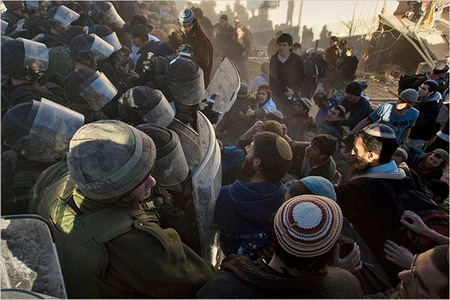As Palestinians watched from rooftops and windows, some settlers shouted at the troops, calling them Nazis. A few had sewn yellow stars on their shirts, as Jews were obliged to do under Hitler. On a wall near the confrontation, Hebrew graffiti declared, "There will be a war over the House of Peace."
Much is at stake for both sides in this confrontation because the Israeli government says it wants to ease the construction of a Palestinian state in most of the West Bank, whereas the settlers and their backers say they will do all in their power to prevent such a state. They are focusing partly on increasing their numbers in Hebron, second only to Jerusalem in its historic and religious significance to them.
 |
|
Hundreds of Israeli police officers and soldiers confronted settlers to evacuate the Hebron building called the House of Peace. [Agencies]
|
The four-story building in question was built and owned by a Palestinian who agreed to sell it. He said he had been unaware the buyers were Jews and that he had been tricked, and that he had backed out of the deal. The settlers say that he knew very well what he was doing but that threats against him had made him claim otherwise.
The Israeli government ordered the settlers out. They challenged the order. Three weeks ago, the Supreme Court took the government's side in a 3-to-0 ruling and gave it 30 days to make good on the order. In the past week or two, settlers had grown more rebellious, throwing rocks at soldiers and defacing Palestinian buildings and graves. It was clearly only a matter of time before the army would step in.
The official who made the call for the evacuation on Thursday was Ehud Barak, the defense minister and head of the Labor Party, who said at a news conference later that "what was tested today was the ability of the state to enforce its laws and its essence upon its citizens."
Mr. Barak had met with settler leaders on Thursday morning to find a way out of the confrontation. The settlers emerged from the meeting believing there was still negotiation to be done, but Mr. Barak clearly thought otherwise.
Because elections are scheduled for February and Mr. Barak is his party's leader, opponents of the evacuation accused him of seeking political advantage through his decision.
"Barak sent the army and police as part of the left wing's election campaign and the blood of the casualties is on his hands," said Arieh Eldad of the National Religious Party.
Settler leaders were indignant, saying Mr. Barak had tricked them after talking soothingly to them in the morning. They said there was nothing more scandalous in the land of Israel than for Jews to evict Jews from their homes.
In a separate development, the Israeli government agreed Thursday for the first time in four weeks to allow journalists and foreign aid workers to enter Gaza. The area, ruled by the militant group Hamas, is under a closing led by Israel that severely limits goods and people from going in and out. But only recently did the closing include foreign journalists who had appealed to the government and Supreme Court for renewed permission to enter.
(Agencies via China Daily December 5, 2008)